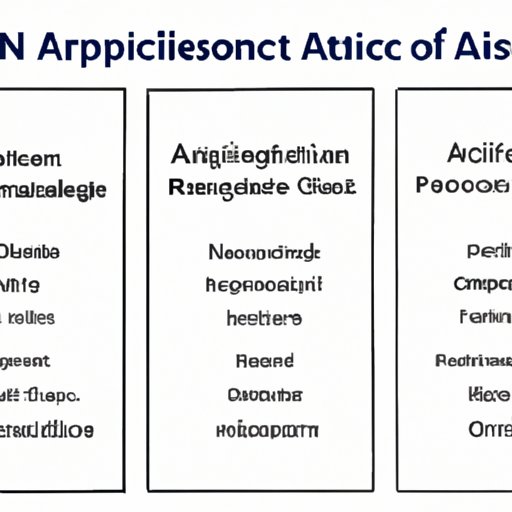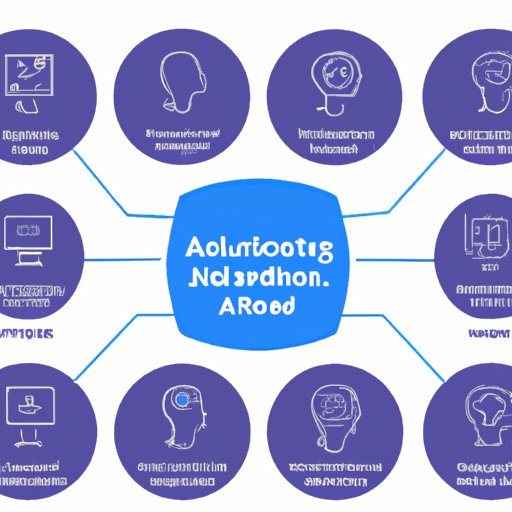Introduction
Artificial Intelligence (AI) engineering is one of the most in-demand fields in technology today. AI engineers are responsible for developing advanced systems that can automate tasks and processes, as well as create more efficient ways of working. In this article, we’ll explore the role of an AI engineer, breaking down the job description, responsibilities, and skills required, as well as outlining career paths and education requirements.

Exploring the Role of an AI Engineer
An AI engineer is responsible for designing and developing intelligent machines and solutions that can automate tasks and processes. This is done by utilizing various techniques such as machine learning, deep learning, natural language processing, computer vision, and robotics. AI engineers must also be able to analyze data and develop algorithms that allow machines to learn from their experiences. As such, AI engineers must have a strong understanding of both software engineering and data science.
AI engineers are responsible for creating new solutions to existing problems, as well as developing new applications based on existing algorithms. They must also be able to identify potential problems before they arise, as well as troubleshoot any issues that may arise during development. Additionally, AI engineers must be able to collaborate with other team members and stakeholders to ensure that projects are completed on time and on budget.
In order to be successful as an AI engineer, it is important to have a strong background in mathematics, computer science, and engineering. Additionally, AI engineers must have excellent problem-solving skills, as well as the ability to think critically and creatively. It is also important to have strong communication skills and the ability to work well in a team environment.

Breaking Down the Job Description of an AI Engineer
The job description of an AI engineer varies depending on the company and the specific project. Generally speaking, AI engineers are responsible for developing and implementing AI solutions that can automate tasks and processes. This involves analyzing data, developing algorithms, and designing and coding software applications. AI engineers must also be able to troubleshoot any issues that may arise during development and testing.
AI engineers must also have a strong understanding of machine learning and artificial neural networks. They must be able to develop models that can accurately predict outcomes and identify patterns in data. Additionally, AI engineers must be able to evaluate the performance of their models and make adjustments as necessary.
AI engineers must also be able to collaborate with other team members and stakeholders in order to ensure that projects are completed on time and on budget. Additionally, they must be able to communicate complex concepts to non-technical stakeholders in order to gain buy-in and support.
The Growing Demand for AI Engineers: A Guide to the Field
The demand for AI engineers is growing rapidly, due to the increasing need for automation and the development of smarter technologies. Companies across all industries are beginning to recognize the value of AI and are investing heavily in the development of new solutions. As such, there is an increased demand for AI engineers who can help develop and implement these solutions.
AI engineers are highly sought after due to their ability to design and develop intelligent systems that can automate tasks and processes. Additionally, AI engineers are also in high demand due to their ability to analyze data and develop algorithms that can accurately predict outcomes and identify patterns in data. As such, AI engineers are highly valued for their ability to develop innovative solutions to existing problems.
What Is an AI Engineer and How Can I Become One?
If you are interested in becoming an AI engineer, it is important to understand the basics of the field. AI engineering involves utilizing various techniques such as machine learning, deep learning, natural language processing, computer vision, and robotics in order to develop intelligent systems that can automate tasks and processes. AI engineers must also have a strong understanding of software engineering and data science.
To become an AI engineer, most employers require applicants to have a bachelor’s degree in computer science, mathematics, or a related field. Additionally, many employers require applicants to have experience with programming languages such as Python, Java, and C++. It is also important to have a strong understanding of machine learning, artificial neural networks, and data analysis.
In addition to formal education and experience, many employers also look for candidates who have a strong portfolio of projects that demonstrate their technical skills and knowledge. Additionally, many employers also look for candidates who have a track record of success in developing innovative solutions to existing problems.
Finally, it is important to stay up-to-date on the latest developments in AI engineering. This can be done by reading industry publications, attending conferences, and participating in online forums. Additionally, it is important to network with other AI engineers in order to stay informed of job opportunities and new projects.
Conclusion
AI engineering is a rapidly growing field with a wide range of opportunities for those who are interested in pursuing a career in the field. AI engineers are responsible for developing and implementing AI solutions that can automate tasks and processes, as well as analyze data and develop algorithms. To become an AI engineer, it is important to have a strong background in mathematics, computer science, and engineering, as well as excellent problem-solving skills and strong communication skills. Additionally, it is important to stay up-to-date on the latest developments in AI engineering in order to remain competitive in the field.
(Note: Is this article not meeting your expectations? Do you have knowledge or insights to share? Unlock new opportunities and expand your reach by joining our authors team. Click Registration to join us and share your expertise with our readers.)
